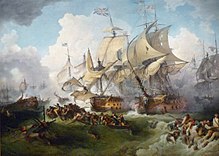Portal:History
The History Portal
History is the systematic study of the past, focusing primarily on the human past. As an academic discipline, it analyzes and interprets evidence to construct narratives about what happened and explain why it happened. Some theorists categorize history as a social science, while others see it as part of the humanities or consider it a hybrid discipline. Similar debates surround the purpose of history—for example, whether its main aim is theoretical, to uncover the truth, or practical, to learn lessons from the past. In a more general sense, the term history refers not to an academic field but to the past itself, times in the past, or to individual texts about the past.
Historical research relies on primary and secondary sources to reconstruct past events and validate interpretations. Source criticism is used to evaluate these sources, assessing their authenticity, content, and reliability. Historians integrate the perspectives of several individual sources to develop a coherent narrative. Different schools of thought, such as positivism, the Annales school, Marxism, and postmodernism, have distinct methodological approaches.
History is a broad discipline encompassing many branches. Some focus on specific time periods, such as ancient history, while others concentrate on particular geographic regions, such as the history of Africa. Thematic categorizations include political history, military history, social history, and economic history. Branches associated with specific research methods and sources include quantitative history, comparative history, and oral history.
History emerged as a field of inquiry in antiquity to replace myth-infused narratives, with influential early traditions originating in Greece, China, and later in the Islamic world. Historical writing evolved throughout the ages and became increasingly professional, particularly during the 19th century, when a rigorous methodology and various academic institutions were established. History is related to many fields, including historiography, philosophy, education, and politics. (Full article...)
Featured picture
Did you know (auto generated)

- ... that the developers of The Pale Beyond were inspired by stories from historical Antarctic and Arctic expeditions?
- ... that Abraham Hamadeh lost one of the closest elections in Arizona history by 280 votes, and has filed multiple lawsuits challenging the results?
- ... that Songs and Flowers of the Wasatch represented a shift in Mormon history toward a "socially-accepted American cultural and religious heritage", according to historian Jennifer Reeder?
- ... that the history of philosophy in India is characterized by its combined interest in the nature of reality, the ways of arriving at knowledge, and the spiritual question of how to reach enlightenment?
- ... that archaeological excavations in the historic town of Kharayeb revealed a rural settlement with a complex system of cisterns and a Phoenician temple?
- ... that American Colossus, a history book that describes how a banker bailed out the U.S. government in 1895, was published around a time when the U.S. government bailed out banks?
William Samuel Sadler (June 24, 1875 – April 26, 1969) was an American surgeon, self-trained psychiatrist, and author who helped publish The Urantia Book. The book is said to have resulted from Sadler's relationship with a man through whom he believed celestial beings spoke at night. It drew a following of people who studied its teachings.
A native of Indiana, Sadler moved to Michigan as a teenager to work at the Battle Creek Sanitarium. There he met the physician and health-food promoter John Harvey Kellogg, co-inventor of corn flakes breakfast cereal, who became his mentor. Sadler married Kellogg's niece, Lena Celestia Kellogg, in 1897. He worked for several Christian organizations and attended medical school, graduating in 1906. Sadler practiced medicine in Chicago with his wife, who was also a physician. He joined several medical associations and taught at the McCormick Theological Seminary. Although he was a committed member of the Seventh-day Adventist Church for almost twenty years, he left the denomination after it disfellowshipped his wife's uncle, John Harvey Kellogg, in 1907. Sadler and his wife became speakers on the Chautauqua adult education circuit in 1907, and he became a highly paid, popular orator. He eventually wrote over 40 books on a variety of medical and spiritual topics advocating a holistic approach to health. Sadler extolled the value of prayer and religion but was skeptical of mediums, assisting debunker Howard Thurston, and embraced the scientific consensus on evolution. (Full article...)
On this day
April 5: Feast day of Saint Vincent Ferrer (Catholicism)
- 919 – The Fatimid Caliphate began a second unsuccessful invasion of Egypt, then under Abbasid rule.
- 1614 – Pocahontas (pictured), a Native American woman, married English colonist John Rolfe, leading to a period of peace between the Powhatan people and the inhabitants of Jamestown, Virginia.
- 1944 – Siegfried Lederer, a Czech Jew, escaped from Auschwitz with the aid of an SS officer who opposed the Holocaust.
- 1986 – The Libyan secret service bombed a discotheque in West Berlin, resulting in three deaths and 229 others injured.
- 2009 – The North Korean satellite Kwangmyŏngsŏng-2 was launched from the Tonghae Satellite Launching Ground and passed over Japan, sparking concerns it may have been a trial run of technology that could be used to launch intercontinental ballistic missiles.
- al-Nuwayri (b. 1279)
- Thure de Thulstrup (b. 1848)
- Marie-Rosalie Cadron-Jetté (d. 1864)
- Judith Resnik (b. 1949)
Selected quote
"Strike an enemy once and for all. Let him cease to exist as a tribe or he will live to fly in your throat again".
— Shaka, 19th century Zulu king
Related portals
More Did you know...
- ... that on 26 April 1881 HMS Doterel (pictured) exploded, killing 143 of the 155 crew members?
- ... that causes of the deaths at the Berlin Wall included shooting, drowning, suffocation, suicide, and falling from a balloon?
- ... that the 19th-century swindler Bertha Heyman, known as "The Confidence Queen," conned men by pretending to be a wealthy woman who was unable to access her fortune?
- ... that only four great uncial codices have survived until the present day?
- ... that after World War II, Polish resistance organizer and Warsaw Uprising fighter Jan Mazurkiewicz was brutally tortured by the authorities in communist Poland?
- ... that tiny Paederus beetles may have caused some of the ten Plagues of Egypt?
- ... that the only known report of bloodshed during the simulated Nazi invasion of Winnipeg was from a woman who cut her thumb while preparing toast?
- ... that Dacian bracelets were used as currency and votive offerings?
Topics
Categories

History • By period • By region • By topic • By ethnic group • Historiography • Archaeology • Books • Maps • Images • Magazines • Organizations • Fictional • Museums • Pseudohistory • Stubs • Timelines • Chronology • People • Wikipedia historians
WikiProjects
![]() WikiProject History •
Ancient Near East • Australian History • Classical Greece and Rome • Dacia • Former countries • History of Canada • Chinese history • European history • Heraldry and vexillology • Indian history • Jewish history • Medieval Scotland • Mesoamerica • Military history • Middle Ages • History of Science
WikiProject History •
Ancient Near East • Australian History • Classical Greece and Rome • Dacia • Former countries • History of Canada • Chinese history • European history • Heraldry and vexillology • Indian history • Jewish history • Medieval Scotland • Mesoamerica • Military history • Middle Ages • History of Science
WikiProject Time • Days of the Year • Years
WikiProject Biography • Composers • Political figures • Saints • United States Presidents
Things you can do
 |
Here are some tasks awaiting attention:
|
Associated Wikimedia
The following Wikimedia Foundation sister projects provide more on this subject:
-
Commons
Free media repository -
Wikibooks
Free textbooks and manuals -
Wikidata
Free knowledge base -
Wikinews
Free-content news -
Wikiquote
Collection of quotations -
Wikisource
Free-content library -
Wikiversity
Free learning tools -
Wiktionary
Dictionary and thesaurus
























































